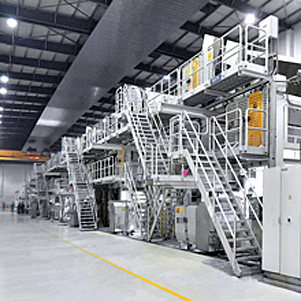Voith’s New EcoCal Plus Reduces Production Costs in Board Manufacturing
![]() Print this Article | Send to Colleague
Print this Article | Send to Colleague
 With the new Voith (Germany) EcoCal Plus calender, papermakers can produce high-grade board products with high stability and lower basis weight. The special thermal smoothing of the EcoCal Plus allows raw material savings of up to 3.5%. In addition, the process results in an improved surface structure of the paper.
With the new Voith (Germany) EcoCal Plus calender, papermakers can produce high-grade board products with high stability and lower basis weight. The special thermal smoothing of the EcoCal Plus allows raw material savings of up to 3.5%. In addition, the process results in an improved surface structure of the paper. The demand for board grades with maximum possible bulk has been growing steadily over the past few years. With lightweight and stable board products, significant cost savings can be achieved, for example, in the mail-order business. At the same time, board packaging products are increasingly important for advertising of consumer goods by focusing attention on the package contents, which indirectly support its sales. Good printability and surface quality are just as important as stability and low weight. Both properties are positively influenced by the EcoCal Plus calender.
For the production of these board grades, the manufacturers usually use high fresh fiber content. Secondary fibers are only added in some cases. Lower basis weights and maintaining or improving board properties are therefore crucial for lowering resource consumption and production costs on the manufacturer side.
The hard nip calender plays a decisive role in the manufacturing of high-quality, stable board with low basis weight. It smooths the paper surface and gives the board a uniform surface. This is where Voith’s EcoCal Plus comes in. The machine calender used for pre-calendering makes use of the fact that surfaces can be smoothed more easily when moisturized and warm. Voith thus equipped the EcoCal Plus with an external induction-heated system that additionally heats the thermo roll to a temperature of up to 260°C. This is considerably higher than the temperatures of conventional systems with 200°C. The EcoCal Plus also has an additional nozzle moisturizer for intensifying the bulk-preserving smoothing effect by regulating the paper web temperature.
With thermal smoothing, less mechanical force must be applied to the paper web. As a result, the bulk loss is much lower than with conventional calendering. Paper smoothed with the EcoCal Plus thus has a higher specific volume. The process has another advantage: through the optimum interplay between temperature, moisture, and line load, the board surface structure is optimized. This is especially important for the packaging of high-grade foodstuffs, cosmetics, electronics, and medical products. The uniform surface and the higher stiffness greatly ease the tasks of board finishing and printing.
The moisture and temperature gradients used in calendering with the EcoCal Plus require only a negligible amount of additional energy. However, this is more than balanced by the economic advantages offered by the EcoCal Plus. The EcoCal Plus technology allows papermakers to reduce their fiber consumption. This saving greatly improves the cost efficiency of the plant: an annual production of 500,000 metric tons with a1% saving in raw materials use translates into savings of around EUR 250,000 per month for the manufacturer.
In practice, the savings potential is much higher: EcoCal Plus calenders have been in operation since 2011 and have achieved bulk savings of up to 3.5% due to the uniqueness of the technology. Thus, the break-even point for investment in the technology can be reached after half a year, depending on the machine size. Alternatively, with the EcoCal Plus, lower-cost raw materials can be used to achieve the same board quality, which also drastically lowers production costs.
The EcoCal Plus calender can be integrated into existing plants as an upgrade. Especially practical is the ability of the calender to be installed in a short period of time during a planned shutdown. In new plants, the technology provides great efficiency right from the start.


